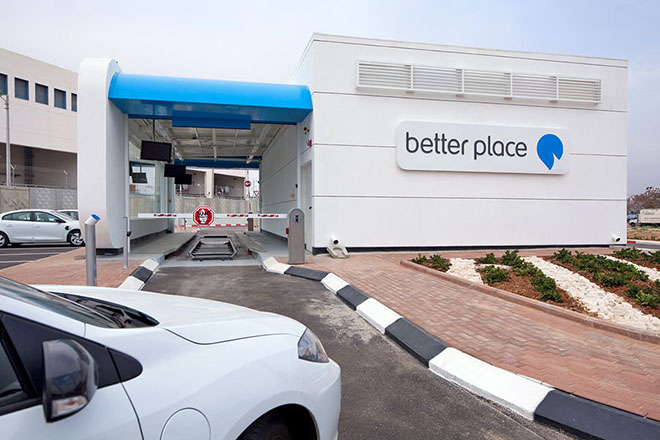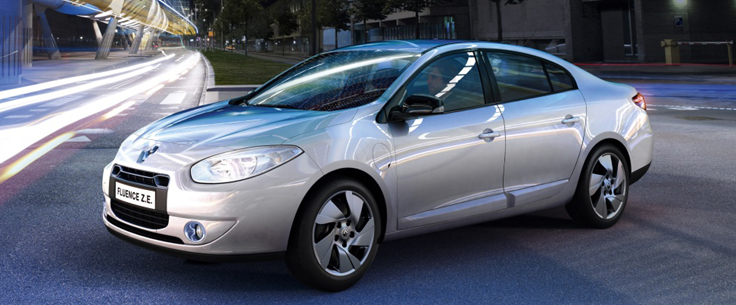An ambitious plan to build an electric vehicle infrastructure in tiny Israel has backfired as the company, Better Place, announced on May 26, 2013 that it was closing its doors. It seems that for every two steps forward taken in the EV world, there are just as many two steps back.
I have written about the challenges EV technology faces, the need for an infrastructure as reliable and ubiquitous as that which supports internal combustion engines. But alas it doesn’t exist. Better Place, an Israeli company, hoped to build stations throughout the country and when launched confidently predicted 100,000 EVs on the country’s roads by 2010. That of course has not happened. Today, with the demise of the company, three dozen EV switching stations are now orphans without much of a future unless someone else picks up the ball.
Initially the company raised almost $850 million in private capital but has spent much of it while going through multiple CEOs, each trying to make the business model work. Part of the problem was overly optimistic forecasting. The other was the lack of EV manufacturer support with only one, Renault, signing up with its Fluence Z.E. EV sedan. The EV had to be redesigned to make it easy to switch out and replace the battery. The Fluence , seen below, has a battery range of between 80 and 200 kilometers (50 to 120 miles) between charges, with an estimated battery recharge life of 3,000 charging cycles.
Better Place’s business model was built on the premise that a cheaper EV could be built if the battery were taken out of the cost equation. Every Better Place EV car customer would:
- Buy or lease an EV easily accessible, switchable battery.
- The customer would beg given unlimited access to a lifetime of batteries.
- An EV owner would charge his or her car at home or at work every day.
- If needed the EV owner would visit a Better Place switch station and replace the battery.
- As new battery technology came out, Better Place subscribers would automatically be able to get the most up-to-date technology.
- Upon resale the EV would retain better street value because the battery technology would be current.
But the optimistic forecasts of 100,000 EVs on Israel’s roads by 2010 never materialized and Better Place’s business model just “ran out of charge.”
With the liquidation it is hoped that the existing subscriber network and switching station infrastructure will continue to function. But who knows. In the article that appeared in the New York Times, Isabel Kershner described Better Place as a vision that was ambitious in a company “hobbled by problems and delays.” In the end less than 1,000 Israeli subscribers signed up with several hundred more in Denmark, not even close to the 100,000 initially anticipated by the founder. So a Better Place turned out to be “not so much.”











The basic problem with electric cars is the practical maximum 130 Wh per kg of expensive battery weight. The new battery designs that pretend to significantly break that barrier are sort of like new designs for fusion reactors. Electric car promoters have been promising better batteries for the last couple of decades; no one has seen one work yet. The sort of air-conditioned electric car that most people would like to own and drive is going to weigh upwards of 2500 pounds. If a 2500-pound car is to be propelled exclusively by batteries, the batteries must store upwards of 100 kWh of energy. Forget the costs of the car itself; the initial costs of the 100 kWh of batteries and electric drive train will likely exceed $20,000. Even if the 100 kWh of batteries is available, prolonged battery life mandates that no more than 50 kWh be discharged from the batteries before recharge. So we have an electric car with a 100-mile range before recharge. The range anxiety factor with that limited battery storage is just insurmountable in the market place.
So the best technical solution is an electric drive hybrid such as the Chevy Volt. But the Volt has another serious problem. Someone must pay $20,000 for a decent gasoline powered vehicle (Chevy Cruz), and then add at least another $15,000 for the battery electric part of the drive train (Volt drive train). If governments want many of their citizens to drive electric cars, they will need to somehow solve the range anxiety problem and then pay manufacturers $12,000 for every electric vehicle sold, and then the governments need to guarantee the batteries for a decade. Governments offer less than half that amount only as tax rebates to individual buyers, and they are silent about battery life. It’s halfway measures way too little way too late. The practical reality is that per mile costs for electric cars is significantly higher than costs for ICE cars. If you are worried about the atmospheric CO2 burden created by gasoline-only Chevy Cruze’s, you would be better off if government spent it’s Volt electric car subsidy money planting trees. Until electric car promoters can produce and demonstrate the low cost, long lived, 250 Wh/kg, batteries or fuel cells, they need to abandon their dreams of electric cars displacing ICE cars.
This is not the future.
the future is like that inception
http://lenrnews.eu/wp-content/uploads/2012/07/LENR_CARS_NChauvin_ILENRS-12x.pdf
and I can say that it is not the only company on the ramp to make a car.
You may not be aware, but I discover that the Swedish report by elforsk on e-cat is raising much business interest, yet in silence.
for the global story
http://www.lenrnews.eu/lenr-summary-for-policy-makers/
and after look for details…
AlainCo– the techwatcher of lenr-forum. (see my scoop.it too)
Dear Alain,
I’m following the latest Rossi story with interest. Waiting for verification before I write an ECat update.
Don’t get your hopes up; Rossi still has loads of tricks to play. If e-cat were real it would be so wonderful that the world would transform into a quasi paradise. Hence, the will to believe is very strong among the 97% of the public that is scientifically illiterate. Rossi hasn’t bothered to melt a plastic garbage pail of crushed ice yet. I’m betting he never will. As far as I can discover, no conclusive demonstration has yet been published.
You just need to read more and search more. It took me 2 month. today it should be faster.
If you are lazy, ask the boss of National instruments, or the Cold Fusion editor of Natrwissenschaften (Ed Storms)… links are in the link you did not read.
Maybe try to call Stanford Research Institute, or ENEA…
read that for link to elemebnts:
http://lenrnews.eu/evidences-that-lenr-is-real-beyond-any-reasonable-doubt (ed storms review 2010, thomas kuhn presentation, may interest you).
Rossi is not the best horse anyway.
BTW: Please, forget about Wikipedia information, they are so dishonest that Rossi had to sue them to make them admit what the court have decided. Wikipedia is a shame today. I’m sad. On disputed subject it is no more presenting the controversies but captured by truth-priests, some which are often not even matching mainstream experts opinion.
Breakingnews: By the way one point where I’m wrong is that maybe LENR-Cars won’t be the first one… rush-hour.
read the data, enough is public.
Well, I went to http://arxiv.org/ftp/arxiv/papers/1305/1305.3913.pdf and invested the time to study all 27-bloated pages of the “independent verification” report on hot cat. I was struck by the “investigators’ “flat out unqualified statement that the hot cat makes considerable excess energy, and it makes it at very high volumetric and gravimetric densities. Even more so I was struck by the fact that over 50% of the “independent” report pertains to the detailed complexities and ambiguities of trying to plausibly assess actual thermal energy output through the purely theoretical application of the Stefan-Boltzmann fourth power radiation law. I’ve posted several times that until Rossi’s cats publicly and rapidly simply melt several garbage pails of crushed ice, I must disbelieve. Rossi must understand that too, yet he still insists on ridiculously complex methods of testing, not on simply melting ice.
It’s impossible for anyone the play the game Rossi is playing without a generous ration of deviousness. I’m sympathetic with that. Still, Rossi’s words are not credible because he lies a lot. It’s impossible to judge from the latest report whether or not e-cat is real or hoax or fraud, but this seems to me one of the few cases where Occum’s Razor is the best way to shave. Rossi insists on very complicated tests because he knows e-cat won’t pass simple tests.
It’s likely that to enable the conduction of a conclusive public demonstration of any species of “excess energy” cat, nearly any local electrical utility company would provide a free tamper-proof meter, dedicated power feed, and electrical engineer to monitor power use. That would sufficiently settle the input energy question.
High school physics classes equipped with instruments consisting only of cheap wristwatches, plastic buckets, bathroom scales, and alcohol tube thermometers, could weigh several garbage pails of crushed ice, and the amount of near freezing liquid water produced by recirculating water through the cat’s guts and the garbage pails of crushed ice. That would settle the output energy question.
What could be easier or more definitive? Do a test run with electrical power applied and no hydrogen in the cat. That gives a null reference. Then let Rossi inject the hydrogen, his secret ingredient, shock his strange cat anyway he likes, and have the high school students simply measure how much faster the ice melts. Rossi might be able to fool professors of physics, but it seems extremely unlikely he could fool the high school students, investors, or the public, with the simple melting ice test. When Rossi rapidly melts a few garbage pails of crushed ice with an objectively supervised and dedicated mains power supply, I’m a believer, and an investor, as I suspect you also would be.
Thank you for the additional digging. You attached it to my article on the Israeli EV failure. It would have been better to put these comments with one of the many articles I have written about LENR technology.
About the null test, it was done.
I agree that the best would be, like Nelson did with Hyperion, to make a blank run, and then refill. But Hyperion is different from E-cat which is a sealed container.
About what you say about researchers and student, I fully agree that inviting students, magicians, would increase the fraud detection, and avoid forgetting simple checks.
Anyway the professors have checked more than written.
I think that they took the lesson and will report all the small check they did (like checking the weight, looking at the socket, measuring various parameters…).
The heat measurement is not the most precise (no need for 600%), and was the answer to some skeptics afraid of conspiracy… the story of Rossi test is a series of response to unsatisfied skeptics, that again disagree.
It seems that DGT simply stopped trying to please those clients, to focus on his clients, just leaking a small pamphlet that put all the charge of evidence on Nelson credibility.
SRI report is more precise, but doomed with accusation of sympathy of SRI to LENR.